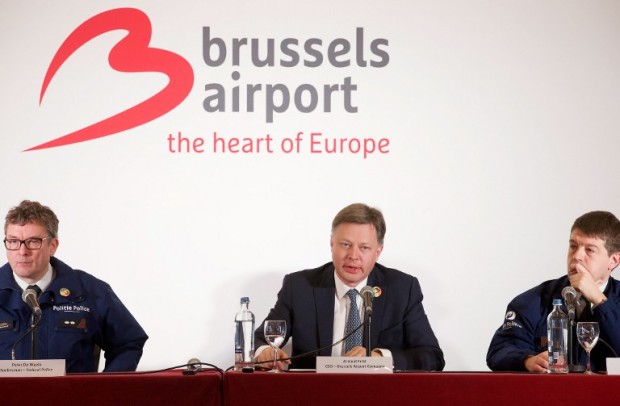
(LtoR) Federal Police spokesman Peter De Waele, Brussels Airport CEO Arnaud Feist and Federal Police spokesman Michael Jonniaux give a press conference regarding the reopening of Brussels Airport on April 2, 2016 in Zaventem.
Brussels Airport is to reopen Sunday, 12 days after its departure hall was wrecked by Islamic State suicide bombings, with chief executive Arnaud Feist announcing three flights. A total of 32 people were killed in the March 22 attacks on the airport and a metro station in Brussels. / AFP / BELGA / NICOLAS MAETERLINCK / Belgium OUT
Brussels Airport reopens on Sunday with three “symbolic” flights and strict additional security checks for passengers, marking a new era for air travel in Belgium after attacks by Islamic State suicide bombers.
The key travel hub has been closed since two men blew themselves up in the departure hall on March 22 in coordinated blasts that also struck a metro station in the Belgian capital, killing a total of 32 people.
The attacks at the heart of Europe shocked the country and many hope the airport’s reopening, albeit in a limited capacity and using a tent-like temporary check-in facility, will help turn the page on this month’s traumatic events.
Brussels Airport chief executive Arnaud Feist on Saturday said the partial resumption of services would start with three “symbolic passenger flights” to Faro, Athens and Turin.
“These flights are the first hopeful sign from an airport that is standing up straight after a cowardly attack,” Feist said.
Tough new checks will be in place after police threatened to go on strike if security wasn’t improved, and travelers have been asked to come in three hours before departure time.
One of the biggest changes will be that only passengers with tickets and ID documents will be allowed into the makeshift departure hall, and their bags will be checked before entering. Once inside, passengers will also undergo the usual security checks.
The airport will initially only be accessible by car. Vehicles will be screened and subject to spot checks, while extra police and soldiers will be on patrol throughout the airport zone.
The first flight will leave for Faro at 1140 GMT, and the number taking off will increase in the coming days.
Still, the airport will be only be able to work at 20 percent capacity using the temporary facilities, handling 800 to 1,000 passengers an hour.
Months to rebuild
Feist said the reconstruction of the departure hall will take months. The damage was severe, with images from the scene showing the building’s glass-fronted facade in shatters, collapsed ceilings and destroyed check-in desks.
Feist said he expected the airport to start running normally again from late June or early July “before the start of the summer holidays.”
The closure of Zaventem airport has wreaked havoc on the travel industry, triggering a drop in tourist arrivals and forcing thousands of passengers to be rerouted to other airports in and around Belgium.
Brussels Airport, which claims it contributes some three billion euros ($3.4 billion) annually to the Belgian economy, has not released any figures on the economic impact of the shutdown, but top carrier Brussels Airlines has said it has been losing five million euros daily.
With 260 companies on-site employing some 20,000 staff overall, the airport is one of the country’s largest employers.
Hotel reservations in the capital have fallen by 50 percent since March 22, the Brussels Hotels Association said.
Belgium’s tourist industry was already suffering from the aftermath of Islamic State attacks in Paris last November, which killed 130 people.
Several of the Paris attackers had links to Brussels and the city went into lockdown for several days after the carnage in neighboring France, with security forces fearing an imminent attack.
The sole surviving Paris suspect, Salah Abdeslam, was arrested in Brussels on March 18, meters from his family home, just four days before the Brussels killings.
He denies having any prior knowledge of the attacks in the Belgian capital, although investigators have uncovered links with two of the bombers.
Belgian police are still hunting for a mystery third suspect, known as “the man in the hat,” who was seen in CCTV footage next to the two airport bombers.
RELATED STORIES
After 10 days, Brussels airport remains closed to passengers
Brussels airport closed until at least Tuesday

